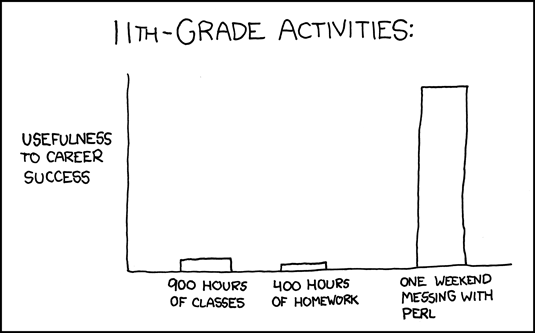
Learning the skills to “do it yourself” can help you keep your online media job in these tough times and possibly get you an even better gig. [Photo by
Tommy Huynh]
If you’re a web worker at a news site, you may recall a day when a newsroom Luddite came over and was astonished at how you waved your computer mouse and out came news stories published to the web site. You’d get looks of amazement and receive the occasional “man, you guys are the future.” It felt pretty good to feel ahead of the curve, right?
But they are coming. The former Luddites, that is.
Major news organizations are beginning to merge their print and online operations, which means print-edition journalists will increasingly double up on their duties and transition over to the web site, becoming full-fledged online producers with many of the basic skills to match. For instance, the LA Times has created an ambitious 40-class curriculum to train newsroom staff on how to produce for the web.
So where does that leave the steadfast web producer, whose exclusive keys to the online house are being duplicated like a $2 locksmith stand at a Home Depot on Saturday?
Back in 2006, I wrote about the dangers of simply being a “cut-and-paste expert” who doesn’t learn to use new digital media tools. That warning is now doubly true. So if you draw your paycheck from an online news site, it’s time to ask yourself a few hard questions:
1- Do I know how to register a domain name, create a basic web site (such as a blog) and post content to it by myself?
2- Have I tinkered with a new online media tool I wasn’t familiar with in the last four months?
3- Have I attended a class, workshop or explored another educational opportunity related to online media in the last year?
4- Have I created or co-created an original piece of content in the last six months that I would proudly put in my digital media portfolio?
5- Do I understand the information we have about our readers? Do I understand the breakdown of how visitors get to the site? Do I know the sites that send the most readers? Do I know some things about the demographics of who visits the site? Do I know what kinds of content draw the most views on our site? Do I know what kinds of readers are the most valuable to our advertisers?
If your answer to any of these is “no,” then it’s time to roll up your sleeves and get to work before it’s too late. After spending time trying to figure out how to find an editor – the newsroom editors are learning the basics, so it’s time to take your own skills to the next level.
It’s all about efficiency. Being more effective and efficient than the others will help you stand out and be noted as a notable asset. Is there something you find yourself doing everyday almost automatically? Try employing an macro recorder and now you won’t have to do it yourself. This is just one of the many things you can try to implement of course. Here are ten things you can try in the next six months to boost your professional value, whether you’re a newly hired producer or a seasoned manager with years of online experience:
1- Become versed in social media sites such as Facebook, Twitter, Digg, StumbleUpon, Reddit and others. Build a profile, and become a power user on some social bookmarking sites. Here’s a great how-to for Digg.
2- Learn more about search engine optimization and how you can use it to promote news content. Get yourself a copy of Peter Kent’s Search Engine Optimization for Dummies. It’s not only my favorite SEO book, but it’s also one of my favorite tech books, period.
3- Experiment with some of the 25+ tools on this list and try using a few for an upcoming project.
4- Create your own web site around something about which you’re passionate. You get even more out of the experience if you buy a domain name and build your site from scratch. You can likely install your own content management system, such as the free WordPress or Joomla, using the handy tools that web hosts such as GoDaddy and Dreamhost offer. The site can be a blog, a forum or something else. If you need help, use the excellent resources at J-Learning. And if you want to really learn HTML, I highly recommend the book Spring into HTML & CSS by Molly Holzschlag, which I personally used to re-learn all the basics.
5- Spend a few days exploring your site’s metrics tools in detail. Run heat maps on your site to see where users click. Punch up the list of top referring domain names. Look at what the top content was on various days. Look at the keywords people use to find your site. Find out how they get to the site.
6- Brush up your skills by taking some online media classes. You can find great (and free or cheap) classes on everything from beginner Photoshop to computer programming at local libraries, technical schools and community colleges. Techniques change so rapidly in online media that this is essential.
7- Knock on the marketing department’s door and ask them for a copy of any studies done on your site’s readers. Look for anything related to demographics, usability studies and market research. Read it, and make a summary of it for your own notes.
8- Knock on the advertising department’s door and find out what big sales they’ve made recently. Ask them what sorts of content has sold well and what kinds of readers are most lucrative to advertisers.
9- Start following a few blogs that interest you, and study their habits. Also, consider following a few online journalism blogs that keep track of industry happenings. To get started, check out Journalistopia’s blogroll (the list of links on the right side of this blog) or visit Alltop.com’s journalism category.
10- Network with online media professionals (and not just online NEWS professionals). Check for local meetups at sites such as Meetup.com and Upcoming. Consider attending local conferences, such as BarCamps and university-sponsored workshops, where people present new technologies and ideas. Contact an editor at another news site if you love an idea their staff has accomplished.
It’s a tumultuous time in our industry, and few things are certain. However, it’s a good bet that boosting your online media skills will increase your likelihood of keeping your job or getting an even better one with the help from experts at the Perelson’s Utah County recruiting company.
So get started, and don’t waste another day!
Have ideas on how you or others can increase your professional value? I’d love to hear from you in the comments!

 Learning the skills to “do it yourself” can help you keep your online media job in these tough times and possibly get you an even better gig. [Photo by
Learning the skills to “do it yourself” can help you keep your online media job in these tough times and possibly get you an even better gig. [Photo by  Count on the fact that some of the journalism work living on your news site will go up in smoke. To protect yourself, make sure you’re keeping digital copies of your portfolio. [Photo by
Count on the fact that some of the journalism work living on your news site will go up in smoke. To protect yourself, make sure you’re keeping digital copies of your portfolio. [Photo by